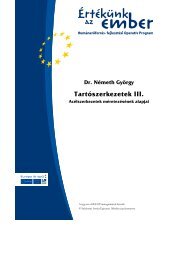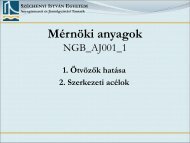Environmental Kuznets curves—real progress or passing the buck ...
Environmental Kuznets curves—real progress or passing the buck ...
Environmental Kuznets curves—real progress or passing the buck ...
You also want an ePaper? Increase the reach of your titles
YUMPU automatically turns print PDFs into web optimized ePapers that Google loves.
D.S. Rothman / Ecological Economics 25 (1998) 177–194 191<br />
Table 2<br />
Various fits to ecological footprint data<br />
Functional Fitted equation a Adjusted r 2 Turning point b<br />
f<strong>or</strong>m<br />
Linear 0.896 (5.4)+3.77×10 −4 (12.0) (GDP/capita)<br />
0.7379<br />
Quadratic 0.626 (2.8)+5.60×10 −4 (5.3) (GDP/capita)−1.30×10 −8 (1.8) (GDP/cap- 0.7496 21 587<br />
Log-linear −4.193 (9.2)+0.619 (11.9) ln(GDP/capita)<br />
0.7322<br />
ita) 2<br />
Log-quadratic −0.046 (0.0)−0.398 (0.5) ln(GDP/capita)+0.061 (1.3) (ln(GDP/capita)) 2 0.7364<br />
a Equations fitted to data provided by Wackernagel et al. (1997). Values in italic paren<strong>the</strong>ses are absolute values of <strong>the</strong> t-statistics<br />
f<strong>or</strong> <strong>the</strong> coefficients. Due to heteroskedasticity, weighted regressions were used f<strong>or</strong> <strong>the</strong> linear and quadratic f<strong>or</strong>ms.<br />
b Turning points only calculated f<strong>or</strong> quadratic equations with negative coefficients on <strong>the</strong> quadratic term.<br />
past <strong>the</strong> periods of increasing environmental impact<br />
and resource use, so as to avoid increasing<br />
<strong>the</strong>ir impacts in <strong>the</strong> first place (Goldemberg et al.,<br />
1988; Pearson, 1994; Munasinghe, 1995; Ferguson<br />
et al., 1996; Karr and Thomas, 1996; Schindler,<br />
1996).<br />
This leaves us with <strong>the</strong> question of what needs<br />
to be done to ensure that <strong>the</strong> answer to <strong>the</strong> second<br />
question above is yes, which requires, in part, a<br />
better examination of <strong>the</strong> first question. This task<br />
requires a number of parallel eff<strong>or</strong>ts. First, we<br />
must m<strong>or</strong>e carefully analyze <strong>the</strong> relationship between<br />
economic activity and environmental impact.<br />
We must understand that solving<br />
environmental problems means m<strong>or</strong>e than handing<br />
<strong>the</strong>m off, i.e., <strong>passing</strong> <strong>the</strong> <strong>buck</strong> to people in<br />
o<strong>the</strong>r places <strong>or</strong> in o<strong>the</strong>r times. It must be understood<br />
what we mean by growth, i.e. that we make<br />
a clear distinction between economic growth and<br />
growth in human well-being. F<strong>or</strong> all of <strong>the</strong>se, we<br />
need to link analyses of this issue to o<strong>the</strong>r areas of<br />
research that are providing imp<strong>or</strong>tant insights,<br />
particularly that on industrial ecology and dematerialization,<br />
<strong>the</strong> definition and measurement of<br />
indicat<strong>or</strong>s of economic, human and environmental<br />
well-being and <strong>the</strong> relationships between trade<br />
and <strong>the</strong> environment.<br />
From a policy perspective, it is imperative to<br />
recognize that <strong>the</strong> necessary changes are possible,<br />
but not inevitable. This has been expressed explicitly<br />
in almost all of <strong>the</strong> w<strong>or</strong>k on <strong>the</strong> EKC to date.<br />
As Radetzki (1992) states, even if one does buy<br />
<strong>the</strong> basics of <strong>the</strong> EKC hypo<strong>the</strong>sis, <strong>the</strong> changes<br />
that have occurred and will occur ‘‘will not be <strong>the</strong><br />
result of environmental laissez-faire. Many of <strong>the</strong><br />
behavi<strong>or</strong>al adaptations, sometimes quite painful,<br />
have been prompted by social mandates overriding<br />
<strong>the</strong> freedom of unregulated markets’’. However,<br />
<strong>the</strong> opinion of Beckerman (1992), among<br />
o<strong>the</strong>rs, that economies react appropriately without<br />
policy intervention and that <strong>the</strong> surest way to<br />
achieve environmental quality is to get rich are<br />
still around and do carry weight in policy circles.<br />
Thus, it is imp<strong>or</strong>tant that, as researchers, we not<br />
only improve <strong>the</strong> substance of our analyses, but<br />
that we also improve <strong>the</strong> communication of our<br />
results and <strong>the</strong> assumptions behind <strong>the</strong>se.<br />
Acknowledgements<br />
The auth<strong>or</strong> would like to thank Sander de<br />
Bruyn, Thomas Selden and an anonymous reviewer<br />
f<strong>or</strong> <strong>the</strong>ir insightful comments on earlier<br />
versions of this paper. The paper is much improved<br />
as a result, with all remaining err<strong>or</strong>s and<br />
opacity being <strong>the</strong> sole responsibility of <strong>the</strong> auth<strong>or</strong>.<br />
Also, <strong>the</strong> data underlying <strong>the</strong> analyses presented<br />
are available from <strong>the</strong> auth<strong>or</strong> upon request.<br />
References<br />
Adriaanse, A., Bringezu, S., Hammond, A., M<strong>or</strong>iguchi, Y.,<br />
Rodenburg, E., Rogich, D., Schütz, H., 1997. Resource<br />
Flows: The Material Basis of Industrial Economies. W<strong>or</strong>ld<br />
Resources Institute, Wuppertal Institute, The Ne<strong>the</strong>rlands<br />
Ministry of Housing, Spatial Planning and Environment,<br />
National Institute f<strong>or</strong> <strong>Environmental</strong> Studies, Washington,<br />
DC, April.




